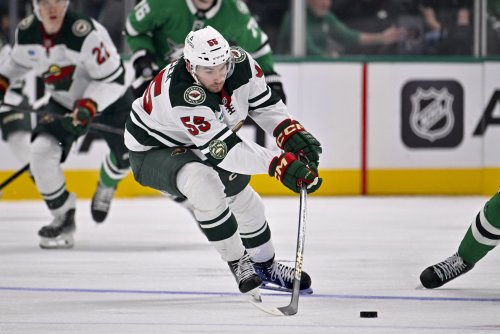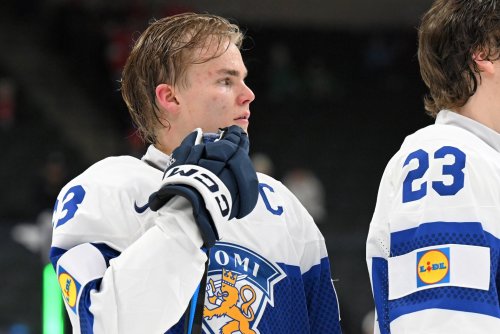.jpg.5e1da9667f08d7992781131a894acca4.jpg)
The story goes that when Spanish Conquistador and genocidal maniac Hernan Cortez landed in modern-day Mexico in 1519, he ordered his fleet of ships burned. Was it a practical decision? No. It was about sending a message. His forces would destroy the Aztec Empire or be destroyed in turn. There would be no retreat.
That is admittedly kind of a ridiculous anecdote to lead into talking about a general manager trying to keep his hockey team competitive despite a $15 million salary cap disadvantage. For one, if Bill Guerin succeeds in getting the Minnesota Wild to be a playoff team, it won't be a net negative to humanity. But when embarking on this season, Guerin burned his boats to ensure the only way was forward.
In September, Guerin signed Mats Zuccarello, Marcus Foligno, and Ryan Hartman to extensions. Each player was an unrestricted free agent at the end of the season but expressed their desire to remain with the Wild long-term. Guerin obliged. He kept the trio around for two, four, and three more years, respectively, armed with no-trade and no-move clauses.
The upside of these deals was that if the Wild stayed competitive this season, they could maintain the continuity and momentum into the next several seasons. Perhaps not having the looming cloud of uncertainty would enable them to play their best.
Of course, the downside is that if things go wrong, then Guerin burned his boats. If the Wild were, say, five points out of a playoff spot on January 11, entering trade deadline season with veterans like Zuccarello, Foligno, and Hartman would be a great way to salvage the season. These players were all on team-friendly deals. In Foligno and Hartman's case, they are arguably way cheaper than the value they provide. Teams want those kinds of players, and Guerin could have gotten a haul for them.
But no. There would be no retreating. The Wild limited their options to winning or disaster.
It's becoming clear which path the Wild are going down. It is January 11, and the Wild are five points out of a playoff spot. After 40 games, the Wild are tied with the Buffalo Sabres in the standings, jockeying for the sixth-best draft lottery odds in the league. And that's after Guerin played the coaching change card.
Sure, injuries ravaged the team in a way that would be hard to predict. Jared Spurgeon has only played in 16 games. Jonas Brodin has been out for 15 games and counting. And now Kirill Kaprizov has missed six games, in which the Wild have only scored 10 goals. Is that bad luck that Guerin couldn't necessarily count on? Yeah, that's safe to say.
The problem is that the Wild would always have to operate on thin margins, even at their best. Their salary cap woes have escalated to $15 million in buyout penalties. The strain would always show, even if the Wild overcame it. Minnesota's vaunted depth of the past two years is gone. For one reason or another, important players like Kevin Fiala, Matt Dumba, Jordan Greenway, Nico Sturm, Mason Shaw, Calen Addison, and more are gone. That was always going to be the case entering this year.
The Wild were able to sustain key injuries before. Now, one or two sends the whole thing crashing down. Guerin needed to hedge against that possibility, even a little bit, and he did not.
And for what? Minnesota didn't want the team to be uncompetitive or unable to ease their players into the NHL. Mission not accomplished. The Wild have lost six of their last seven games, looking uncompetitive in almost all of them. While Marco Rossi and Brock Faber are thriving with responsibility, we're seeing the team have to rush rookies like Daemon Hunt and, most recently, Jesper Wallstedt into NHL action before they are ready.
By burning his boats. Guerin threatens to have a compounding cost on the team's future. Not only did he forfeit any assets that could have come back the team's way -- assets they could have used to acquire players when the salary cap hell is over -- he did it to keep depreciating assets around. Zuccarello, Foligno, and Hartman will all be 30 and over next year. In two years, will Guerin wish he had a boatload of assets he could use to acquire the next young star player to hit the trade market or a collection of vets in their mid-to-late 30s?
The Wild can still get a bright light at the end of this disaster year's tunnel, of course. If they land a Macklin Celebrini or Cole Eiserman in the draft, will that somewhat offset the opportunity cost those extensions created? Definitely. But they also could have had both, and shipping out those three contracts for assets would also help their chances of celebrating Celebrini in the organization.
It's not a failure if the Wild can't drag a $15 million anchor over the finish line and end up in the league's basement. It's a hard task that would be difficult for any GM to overcome. It is a failure not to secure the flexibility to pivot to a Plan B if things go wrong. In that sense, Guerin hasn't just failed. He specifically engineered a situation where he would be guaranteed to do so if things went sideways.
If you burn your boats and accomplish your goals, it seems justified in retrospect. But what happens if you don't? We're seeing it now, and in Guerin's case, it's looking more and more like an unforced error that threatens to hamper his team's long-term ambitions to compete for the Stanley Cup.
Think you could write a story like this? Hockey Wilderness wants you to develop your voice, find an audience, and we'll pay you to do it. Just fill out this form.
-
 8
8






Recommended Comments
Join the conversation
You can post now and register later. If you have an account, sign in now to post with your account.
Note: Your post will require moderator approval before it will be visible.